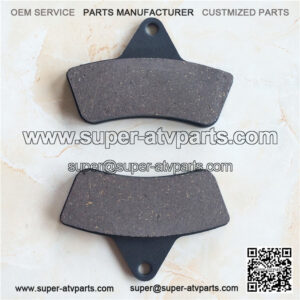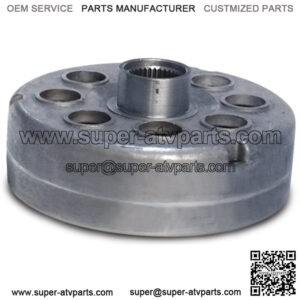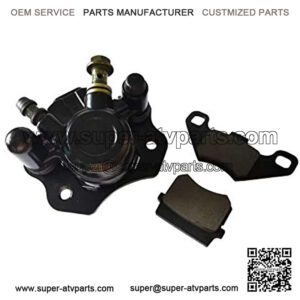Let’s take a look at the three common types of brake noises along with their causes and solutions:
Noise #1: Squealing Or Squeaking Noise
If you hear a squeaking or squealing noise, here’s what could’ve caused it and how you can resolve it:
A. Worn Brake Pad Material
Brake pads have a metal wear indicator — also known as a brake wear indicator. This metal tab rubs against the brake disc when the brake pads are worn out — causing friction and brake squeal.
Solution: Get a replacement for your worn brake pads before you get brake rotor damage.
B. Dirty Brakes
In a disc brake system, brake dust gets trapped between the braking pad and the brake disc (rotor) — causing uneven braking and a squealing noise.
While in drum brakes, the sound could be a result of accumulated brake dust within the drums.
Solution: A mechanic should inspect the dirty brakes and remove any brake dust and foreign debris on every affected brake component.
C. Glazed Brake Rotor Or Drum
Both the brake rotor and brake drum wear over time — resulting in a glazed finish. Because of this, your brakes could make a squealing or squeaking noise.
Solution: A mechanic should inspect each disc rotor or drum for signs of damage such as cracks and heat spots to determine if the parts need resurfacing or a replacement.
D. No Lubrication On The Brakes
In a vehicle with rear drum brakes, you could experience a squealing sound if the backing plate and other brake components aren’t properly lubricated.
Meanwhile, a brake squeal or squeak in a disc brake system could be the result of sticky movement on the caliper piston.
Solution: A mechanic should lubricate all the necessary components of your car’s brakes — such as the caliper piston, the backing plate, and the disc rotor and brake pad contact points.
E. Poor-Quality Friction Material (Brake Lining)
Brake lining that uses poor-quality friction material usually wears down quickly and could cause a loud squealing noise in your brake system.
Solution: Get brake pads with high-quality friction material from an auto shop and let a reputable mechanic fit it in for you.
Noise #2: Grinding Noise
Do your brakes make a loud grinding noise?
Let’s take a look at where that noise comes from and how you can get rid of it:
A. Worn Brake Pad Or Brake Shoe Material
Usually, a grinding brake noise means the brake shoe or brake pad is worn out. This causes excessive heat build-up from friction in the braking system as worn parts are less able to dissipate heat.
Solution: Get your brake pads or brake shoes replaced before the friction material undergoes extreme wear. However, don’t buy cheap brake pads or shoes as these will wear away sooner.
B. Sticking Caliper Or Wheel Cylinder
In a disc brake system, a sticking caliper could continuously compress each braking pad against the disc rotor — causing brake grinding. You may also hear a loud grinding sound if the rotor disc is in contact with part of the brake caliper.
Meanwhile, in a drum brake system, brake grinding is produced when a stuck wheel cylinder continuously jams the brake shoe against the drum.
Solution: If your car has a disc brake system, a mechanic should remove the caliper and grease its slides. For drum brakes, it’s the contact points of the wheel cylinder that need greasing. If this doesn’t solve the issue, these parts might need to be replaced.
Noise #3: Clattering, Vibrating, Or Rattling Noise
Do you feel a judder (vibration) or hear a rattling or clattering sound when you hit the brake pedal?
Let’s go through all these brake noises and find out how you can eliminate them:
A. Warped Rotor
If you’ve got a warped rotor, the rotor surface will make uneven contact with the brake pads — causing pedal pulsation, a vibrating steering wheel, or a thumping sound.
Solution: You should have the brake system checked and each warped rotor or drum replaced to get rid of the vibration or thumping sound.
B. Incorrect Adjustments Or Missing Brake Hardware
You could experience a vibration or hear annoying brake sounds if some brake system components — like the anti-rattle clips, anti-rattle shims, and brake lining — are missing or not correctly adjusted.
Sometimes, a judder, pedal pulsation, or a vibrating steering wheel could be caused by other car parts like a worn-out ball joint or wheel bearing.
Solution: A mechanic should inspect your brake system and ensure that you’re not using the wrong brake material. They’ll also let you know if you need to replace missing or damaged hardware like the caliper bracket, wheel bearing, the anti-rattle clip, and other car parts.
C. Dirty Caliper Slides
Dirty brake caliper slides prevent the proper functioning of brake pads and cause the brake caliper to stick. This can end up creating a vibration or a clattering noise.
Solution: A mechanic will clean the caliper slides and any other dirty brake component that might end up causing an annoying noise or vibration.
About Brake
“atv brake pads”
“atv brake lines”
“atv brake line repair kit”
“atv brake master cylinder”
“atv brake light kit”









